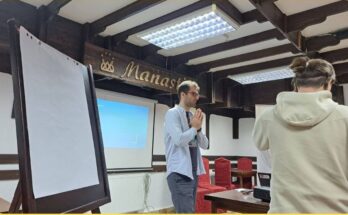Brussels, May 26th, 2020
The newest Franco-German proposals to cover and share the costs of the Covid19-crisis commonly, are a good and necessary step. We are happy to see the Franco-German couple is alive again. It was necessary and is a strong sign towards other reluctant governments that the two commit to the greater European good and underline European solidarity after a few months of primarily national responses to the crisis. Yet, there is a bitter aftertaste: The Franco-German proposal was announced whilst the executive of the EU, the European Commission, was in fact working on its own proposal which is announced for this week. Whilst the proposal strengthens Europe, on a meta-level it still underlines the problematic intergovernmental dynamics of the European Union, that is the prevalent role played by Member States in such institutional setup.
We call on the few reluctant governments to come forward now and realize that a united and strong European Union is the only possibility to realize our common interest as European citizens.
Malte Steuber, President of the German section of the Young European Federalists, underlines: “First and foremost, we are happy to see the German government is getting on track again. It was as right for all the organizations to push for it as it was to stay optimistic and applaud this initiative. The French-German friendship is one of the backbones of the European integration. Having this partnership back is a good sign, especially after the Meseberg Declaration. We see the change of opinion as a wakeup call to other governments who are still hesitant. Now, France and Germany need to continue the dialogue with the other Member States and never forget, they are two relevant countries but the EU is made up of 27 member states and the European institutions who were tasked with making a proposal in the first place.”
“At this difficult time, this initiative is welcome: when Germany and France work hand in hand, Europe wins. But we have to be careful, this plan must not only be an economic one. It must be a green and social one, by making the Green Deal the central axis of European policy.” Says Marie Caillaud, President of the French section of Young European Federalists. “Above all, this recovery plan must be an opportunity to go further in European unity. The squabbles between Member States over the budget are not representatives of what is at stakes. We will ensure that the recovery is genuinely European, without futile national opposition but with a true European solidarity.”
“The history of the European integration process shows us the importance of the Franco-German partnership. But we know this will not be enough if a long-term vision for the future of Europe and its citizens will not be provided.” says Leonie Martin, President of Young European Federalists. “It is time to leave behind the limits and the hybridity of the intergovernmental system in favour of the project for a real federal Europe. The solutions to overcome the deep crises will be decisive only if included on a broader project of change, towards a democratic and united Europe.”
Background on the recovery fund
The French-German initiative wants to raise €500 billion of EU bonds. The Member States would act as guarantees for a certain amount of money in case the loans can not be redeemed. The recovery plan would be set in the multiannual financial framework 2021-2027, on top of the €540 bln. billion of loans already announced by the Eurogroup. Those grants are supposed to help the countries and regions most struck by the Covid-19 pandemic. Other than the original Corona bonds, the Member States are only liable for their part of the debt; European Commission – not the Member States – proposes what the money should be used for. A lot of details are yet to be decided, in dialog with the other Member States, since all 27 have to agree to this plan. However, this initiative collides with the Commissions plans scheduled to be presented this week.
About JEF Europe
The Young European Federalists (JEF) Europe is a non-partisan youth NGO active with 13.000 members active in more than 35 countries. The organisation strives towards a federal Europe based on the principles of democracy and subsidiarity as well as respect for human rights. JEF promotes true European Citizenship, and works towards more active participation of young people in democratic life.
About JEF France
Jeunes Européens France, the national section of the Young European Federalists (JEF Europe), has more than 1200 youth volunteers in 30 local sections throughout France. For more than 20 years, we have been promoting active European citizenship among young people through our citizenship education programmes, the presence of our volunteers in the field (debates, street actions) and our Euro-citizen media read by more than 170,000 people per month, Le Taurillon.
About JEF Germany
JEF Germany is the German section of the Young European Federalists. JEF Germany has 4,000 members and around 100 local sections all over the country. It has been active since 1949 and thus one of the oldest pro-european, non-partisan youth organizations in Germany. In recent years, JEF Germany has demonstrated, among other things, for open internal borders, stronger commitment of the German government to the European good and more extensive public reporting on the European elections.




